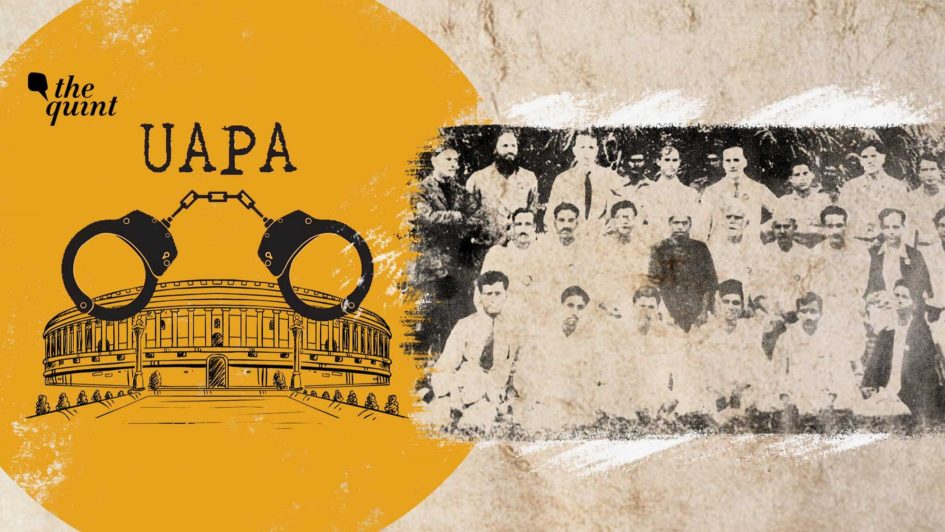July 2021
By- Sania Muzamil
Earlier this month NAPM organised ‘Young People’s Political Persecution and Resistance’, which was co-hosted by Akash Bhattacharya and Siraj Datta. Several distinguished and well known activists including students put their strong opinions forward about how the current regime has revived the draconian laws from colonial era with an increased ferocity and used the same in targeting activists, dissenters and anyone speaking against the totalitarian tendencies of the current political state.
Natasha Narwal who was among the three UAPA accused detainees to be recently released on bail talked about how these laws are being used to break the solidarities created among students in university campuses like Jamia Millia Islamia and JNU among others. She attributed this to a ‘institutionalized targeting’ of genuine voices demanding answers to their political grievances, something that is every citizen’s right in a true democracy. The secular claims of our nation have dissolved with biased and discriminatory laws like CAA-NRC against which people from all walks of life have protested, yet like a true absolutist regime that is drunk on power and always raises the banner of majority support the state has curbed all voices, stifling and marginalizing the subaltern and minority groups further.
This began with the Bhima koregaon case which was handed over to the NIA and several activists were jailed among whom Father Stan Swamy was recently murdered through institutionalized torture and deial of citizen rights. 15 other Adivasis still await a fair trial and their right to step out into the freedom that they deserve.
The session highlighted how the process undertaken in these laws is a punishment in itself because the average time for a person accused under these laws to get bail is almost 3-4 years, which shows the true face of the judiciary, because justice delayed is justice denied. Even getting a trial under UAPA takes years, which is enough to break a person physically as well as mentally, not to mention the torture and inhumane conditions the detainees are subjected to.
The history of the UAPA law was discussed by Nihalsingh Rathod and he emphasized that the current form of these draconian laws is much worse than their colonial versions as during the colonial times, a provision for their misuse was also formed. A history of sedition and anti-terrorist laws; their earlier forms like TADA, POTA along with the later amendments were laid down. The very erratic parameters that are used to declare someone a terrorist make our democracy a laughing stock, as even the killing of Rajiv Gandhi was not declared a terrorist act, yet students protesting against unjust laws are accused of being terrorists. This irony is leading our nation down a very dark and gloomy path of no return.
An incident was narrated to emphasize the arbitrariness of our rules where during some violent incident a man was accused of being a terrorist because he was carrying a banner with ‘Jihad’ written on it. It took him 3 years to prove that the word jihad does not mean or justify terrorism. This very discriminatory nature of our laws creates a sense of fear among the common people, who think multiple times before putting their opinions forward.
The very well-known case of Prof. G.N. Saibaba was talked about and the absolute inhumane conditions he has been living in in an Anda cell in Nagpur were condemned. Several other activists and academicians who have been targeted for speaking up for the rights of the vulnerable and marginalized sections of the society were also mentioned and a resolve to keep fighting for the freedom of one and all was reiterated by every speaker.
People coming together for their constitutional and democratic rights is the worst nightmare for the BJP-RSS government. All these laws that have been put into action are mere tools used to suppress the voices against the atrocities of the regime because the government is well aware that the common man has risen up against the whole system. People are detained and jailed. Bail is a dream that can only be pursued and those who somehow do get released on bail are continually harassed by the police, in order to ensure they do not take part in any anti-state acts.
Maaysha who is the daughter of Sudha Bharadwaj and has been running pillar to post to get her mother released also recollected her horrific experiences of suffering. She raised the question of why people who show concern for the welfare of their people are targeted and tortured. Her mother has been in jail for three years now without committing any crime. Maaysha expressed her disappointment on how we still live like unevolved and repressive beings, and the only difference between earlier times and the current world is that people were shot on spot previously, while now they are jailed and their minds and bodies broken. Anyone speaking against the wrongdoings of a politician is termed as a Naxal or a terrorist, delays in hearings and trials have become a routine and yet she reaffirmed her belief that we haven’t accepted defeat and will never do. She raised her battlecry saying that our bodies might die fighting this corrupt system, but our ideas shall live on.
The session ended with several audience members putting questions to the panelists and reaffirming their support to the movement against injustice. It was soothing to see and know people raising their voices fearlessly and talking about issues that we all feel but lack the courage to talk about. Such conversations are a privilege in itself and shine like slivers of hope through the darkness that has engulfed the minds of our indifferent politicians.

August 1, 2021 at 1:02 am
https://m.facebook.com/story.php?story_fbid=4803182479696383&id=100000140340008